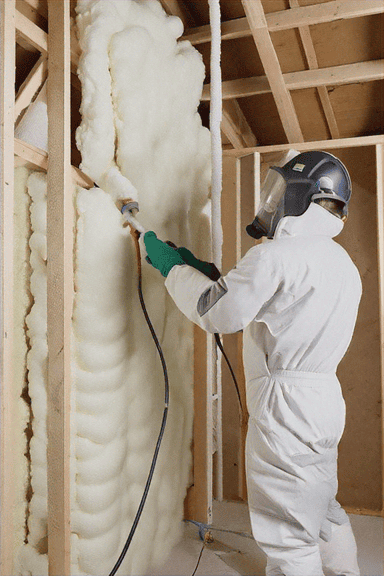
Choosing the right insulation for your property is essential to maintaining comfort, energy efficiency, and cost savings. Two of the most popular options are spray foam insulation and fiberglass insulation. While both have their advantages, they differ in performance, durability, and installation methods. In this guide, we’ll compare spray foam and fiberglass to help you decide which option is best for your needs.
What Is Spray Foam Insulation?
Spray foam insulation is made of polyurethane that expands upon application, creating an airtight seal. It’s applied as a liquid and quickly hardens to fill gaps, cracks, and irregular spaces.
Advantages of Spray Foam Insulation:
- Energy Efficiency: Spray foam provides a superior airtight seal, reducing air leaks and helping you save up to 20% or more on energy costs.
- Durability: It doesn’t sag or settle over time, ensuring long-lasting performance.
- Moisture Resistance: Acts as a barrier against water and humidity, reducing the risk of mold and structural damage.
- Versatility: Ideal for hard-to-reach spaces and irregular surfaces.
Drawbacks:
- Higher upfront cost compared to fiberglass.
- Requires professional installation.
What Is Fiberglass Insulation?
Fiberglass insulation consists of fine glass fibers woven into batts or rolls. It’s one of the most commonly used types of insulation and is relatively easy to install.
Advantages of Fiberglass Insulation:
- Affordability: Fiberglass is one of the most cost-effective insulation options available.
- Ease of Installation: It can be installed quickly, either as batts or loose-fill.
- Fire Resistance: Naturally resistant to fire, adding an extra layer of safety.
Drawbacks:
- Less effective at sealing air leaks, leading to potential energy loss.
- Can sag or settle over time, reducing its insulation performance.
- Prone to moisture absorption, which can lead to mold growth.
Spray Foam vs. Fiberglass: A Side-by-Side Comparison
| Feature | Spray Foam | Fiberglass |
|---|---|---|
| Energy Efficiency | High – Creates an airtight seal. | Moderate – Air leaks may occur. |
| Durability | Long-lasting, no settling or sagging. | May settle or lose effectiveness over time. |
| Moisture Resistance | Excellent – Acts as a barrier. | Poor – Absorbs moisture, risking mold. |
| Installation | Requires professional installation. | Can be DIY or professionally installed. |
| Cost | Higher upfront investment. | Lower initial cost. |
| Best For | Irregular spaces, high energy efficiency needs. | Standard applications with a limited budget. |
Which Insulation Is Right for You?
The best choice depends on your priorities:
- Choose Spray Foam Insulation If You Want:
- Maximum energy efficiency and lower utility bills.
- Long-term durability without maintenance.
- A moisture-resistant solution that protects against mold.
- Choose Fiberglass Insulation If You Need:
- A budget-friendly solution for a short-term project.
- Insulation for a standard, easy-to-reach area.
- An option that doesn’t require professional installation.
Why Choose GV Spray Foam?
At GV Spray Foam, we specialize in providing high-quality spray foam insulation that delivers unmatched performance and value. Whether you’re insulating your home, business, or a specific area like the attic or crawl space, we ensure your property is energy-efficient, comfortable, and protected.
Why Spray Foam From GV?
- Professional installation for optimal results.
- Long-lasting materials to maximize your investment.
- Personalized recommendations tailored to your property.
Ready to upgrade your insulation? Contact GV Spray Foam today for a consultation and learn why spray foam is the smart choice for your insulation needs!

